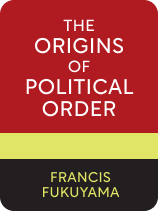

This article is an excerpt from the Shortform book guide to "The Origins of Political Order" by Francis Fukuyama. Shortform has the world's best summaries and analyses of books you should be reading.
Like this article? Sign up for a free trial here.
How is government accountability important to democracy? What can we learn from the history of democracy in England?
One piece of the puzzle that makes up a modern liberal democracy is accountability—a state’s commitment to the rights and needs of the people it governs. In The Origins of Political Order, political economist Francis Fukuyama examines how government accountability evolved in England.
Keep reading to learn about the history and the importance of accountability in government.
Accountability in Government
Before directly addressing the importance of accountability in government, we’ll look at the history that illustrates the point.
Fukuyama emphasizes that England’s is not the only path to a modern liberal democracy—in fact, he criticizes much of political theory for being overly Anglocentric. But England is the only state to develop strong accountability in the time period this book covers (prehistory through the mid-18th century). In many other states, accountable government was a later development that was influenced by the American and French revolutions, 18th-century ideals of liberty and justice, and the Industrial Revolution.
| Accountability Is Separate From Democracy Fukuyama is specifically interested in democratic accountability—in which even elite officials must answer to the non-elite general public. But it’s worth noting that accountability and democracy don’t necessarily go hand-in–hand. To say that officials are accountable is merely to say that they have to answer for their actions and face repercussions for “wrong” actions (whatever that means in a given society). A system that makes lower-level officials answerable only to higher-level officials is accountable, but not democratic. In other words, French lords and Chinese bureaucrats were accountable—to their sovereigns. What made England different was that English aristocrats, government officials, and even the monarch eventually had to answer to the English people as a whole. |
Feudalism as a Precursor of Accountability
Before we turn to the specifics of English politics, it’s worth looking at the broader social and political context in which the English government evolved. Fukuyama argues that European development in general provided the basis for state accountability in the form of the feudal system—a hierarchical system of land ownership in which lords rented their lands to vassals (tenants who were granted rights to the land in exchange for their military or another service).
Fukuyama suggests that feudal societies created a balance of power between the state and the landed classes. Feudal nobles and gentry (a class of landowners who weren’t part of a state’s traditional hereditary nobility) had their own lands, their own incomes from those lands, and, in the case of nobility, castles and armies of their own. This gave them political leverage that counterbalanced state power and pushed rulers to cooperate with those they governed.
Also, feudalism created a nominal sense of obligation for the upper class toward the lower class. The feudal system was contractual in that lords and vassals were bound to uphold their obligations to each other. In theory, at least, those with higher status were supposed to protect those beneath them.
(Shortform note: “Feudalism” is a disputed concept among medieval historians, with some even arguing that the term is an entirely ahistorical construct with no basis in the textual record—according to this view, medieval society was too fluid and varied to be described in terms of any kind of system. Nonetheless, the historical record does back up Fukuyama’s basic points about social obligation and political power in medieval society. For example, various documents from the Middle Ages demonstrate the basic exchange of loyalty for protection as well as the obligation for lords to respect and defend their vassals’ rights.)
From Obligation to Accountability
Fukuyama points out that England, in particular, developed its sense of accountability in part from the Magna Carta, a charter of rights imposed on King John by a group of barons in 1215. The implicit message of the Magna Carta was that the monarch had to answer to the English people as a whole.
But constitutions alone weren’t enough to produce an accountable government, as demonstrated by Hungary. Fukuyama explains that, in 1222, King Andrew II of Hungary was forced to accept the Golden Bull, a document superficially similar to England’s Magna Carta. But, whereas the Magna Carta was a response to perceived oversteps by the king, the Golden Bull aimed to ease tensions between the traditional nobility and the newly emerging gentry. As a result, instead of creating political solidarity (as the Magna Carta did), the Golden Bull aligned the gentry with the nobility at the expense of the Hungarian state and its commoners—a move that undermined the government’s power and led to the country’s invasion and collapse.
Factors Leading to English Democracy
Fukuyama says that, from the start of the Anglo-Saxon period around AD 450, England was organized around local politics (shires). Shires were unique in that they were structured from the bottom up (through the ealdorman) and from the top down (through the sheriff), which led to a balance of power between state and local interests and a sense that the state was accountable to the shires just as the shires were to the state.
According to Fukuyama, England’s local politics most commonly revolved around laws and courts, and, as a result, English monarchs originally derived their legitimacy from their roles as legal arbiters.
Over time, Fukuyama says, the idea of legal legitimacy evolved into the notion that the state’s rule was legitimate only if it had the consent of those it governed. By the 13th century, Parliament essentially co-ruled with the monarch and generally saw their role as protecting all citizens from royal abuses.
After several more decades of strife, Fukuyama says, the principle of consent was finally cemented in the Glorious Revolution of 1688, in which England peacefully deposed James II in favor of William of Orange and Mary II. In essence, the Glorious Revolution established that England’s monarchs didn’t have an absolute right to rule—their authority depended on the approval of Parliament, and by extension, the people.
Why Accountability Matters
Fukuyama concludes his discussion of accountability by explaining that accountability emerges when state power is counterbalanced by other elements of society such as nobles, gentry, and wealthy commoners. In fact, Fukuyama shows that certain political outcomes can be roughly mapped to different levels of state accountability:
- Authoritarianism arises if there are no meaningful opponents to state power (as in Imperial China) or if the state fragments its opponents into disorganized, self-interested individuals (as in pre-Revolutionary France),
- Political collapse occurs if anti-state forces gain too much power and weaken the state to the point where it can’t sustain or defend itself effectively (as in medieval Hungary).
- Modern democracy emerges when the state shares political power with its people as a whole (as gradually became the case in England as Parliament gained power and grew more representative of all English classes).
| A Balance of Power Leads to Open Institutions It can be tempting to view the evolution of democracy as an ongoing increase in popular political power (at the expense of state power). But one of the interesting conclusions we can infer from Fukuyama’s work is that democracy depends on a delicate balance of power between the state and its people. To better understand why that is, we can compare Fukuyama’s model of political development to Daron Acemoglu and James A. Robinson’s concept of open institutions—their term for free, participatory forms of government. In Why Nations Fail, Acemoglu and Robinson argue that open institutions share two characteristics: • Pluralism: Open institutions place limits on their own authority and grant political power to the whole population. • Consistent enforcement: Open institutions have the capacity to ensure that those in power follow the rules of political conduct and don’t erode the rights or power of others. These two characteristics roughly overlap with Fukuyama’s three components of democracy. That is, for an institution to be pluralistic, it must follow the rule of law (which defines the limits of its power) and make itself accountable to all its citizens (whose participation gives them political power). At the same time, an open institution needs a strong enough state to prevent power grabs (such as by a politician who refuses to leave office) or general chaos (for example, if there’s no incentive for private citizens or individual political factions to obey the laws). |

———End of Preview———
Like what you just read? Read the rest of the world's best book summary and analysis of Francis Fukuyama's "The Origins of Political Order" at Shortform.
Here's what you'll find in our full The Origins of Political Order summary:
- What modern democracy is and where it came from
- The three components a stable democratic society requires
- Three important takeaways from Fukuyama's book






